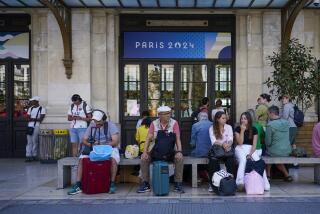‘They Can’t Stop Us ... We Will Carry On as Before’
- Share via
LONDON — Two weeks ago, Londoners responded with stoicism and defiance to the transit system bombings that killed more than 50 people.
On Thursday, after a second bombing attempt against three trains and a bus, residents were relieved by the lack of casualties, but angry and anxious as they slowly made their way home, often in shared taxis or on foot.
“Twice in two weeks is beyond comfort,” said Vlad Cherepanoff, an Australian shoe wholesaler who recently launched a business in London. “It makes you a little more nervous. I take the Tube to work every day, but you have to think twice now. What they did today is prove a point that it is easy for them to strike.”
As reports began circulating shortly before 1 p.m. of “very serious incidents” on the Underground, people on the street exchanged frightened looks and many rushed into pubs or shops where they could see the latest news on television.
Outside closed Tube entrances, they appealed to tight-lipped station workers for any details of what had happened. Sirens wailed as police vehicles and ambulances rushed to the various scenes. Cellphones came out in the anxious search for information.
Some still reacted with determination.
“We are a country at war,” said engineer Ahmad Jassem, 33. “You expect a country at war to suffer attacks on its troops and its people. But they can’t stop us, really. We will carry on as before.”
Hairdresser Angelica Benskaya, 20, said she wasn’t going to worry or avoid using the Underground. “I could get hit by a bus tomorrow,” she said with a shrug.
Mike Evans, 60, who said he was in the insurance business in the British Midlands and regularly traveled to London, was bracing for more attacks. “It is going to go on until it’s finished,” he said.
He said he was angry, but he disagreed with an associate who advised deporting Muslims, noting that most were law-abiding and loyal to the country.
“In all fairness, you have to deal only with those few who are the ones who are causing problems,” he said.
Prarthana Borah, a student who lives in the Warren Street area near one of the targeted Tube stations, was among many residents who posted comments to the BBC’s website. “This incident has shaken me out completely and I am afraid to say I have lost my calm,” she said.
“I have not been affected by the attacks, but what annoys me is that Sir Ian Blair [the Metropolitan Police chief] says get back on the trains and buses. Does he travel to work on them?” wrote Abu Hitash. “As a British Muslim, I am sick to death of militant Muslims. I left Iraq 10 years ago; I will never go back.”
The attempted bombings caused several major Tube lines to be closed Thursday, and disruptions on the Underground from the first wave of attacks have continued, making getting out of central London a nightmare for many people.
Complicating the traffic situation, police closed off broad swaths of the city near the sites of the four attacks, fearing that other explosives might be hidden nearby.
Buses continued to operate. But some passengers noted that both the July 7 bus bomber and the would-be bus bomber Thursday had been on the upper deck. As a result, the lower deck of a bus traveling from King’s Cross Station soon became crowded, with the upper deck at first empty.
Crowding downstairs eventually compelled people to climb, reluctantly, the narrow metal steps to the top.
As in the aftermath of the July 7 attacks, many people purchased or dusted off bicycles to get around.
And with taxis hard to come by in central London, some commuters hopped aboard the pedal-powered rickshaws normally offered tourists as a novelty in and around the West End theater district.
More to Read
Sign up for Essential California
The most important California stories and recommendations in your inbox every morning.
You may occasionally receive promotional content from the Los Angeles Times.













